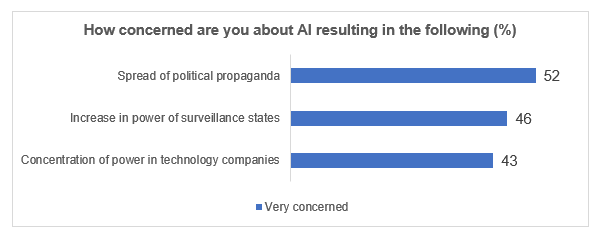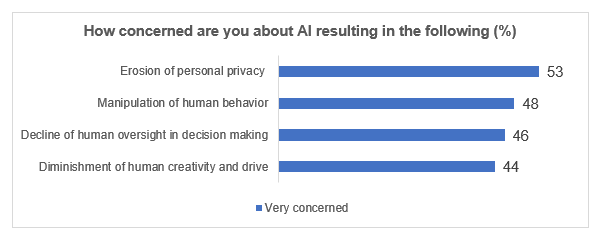
Understanding U.S. Attitudes Toward AI: What the Latest Research Tells Us
Overview
Artificial intelligence is no longer just a futuristic concept, it’s now a daily presence, a workplace tool, a creative partner, and a source of growing debate. As adoption accelerates, the American public is trying to reconcile the promise of AI with its potential pitfalls.
Recent findings from Pew and YouGov reveal a complex, and at times conflicted, American mindset when it comes to artificial intelligence.
AI Use Is Rising Especially Among Young Adults
AI usage is surging, particularly among younger Americans. A new YouGov poll paints a picture of rapid adoption:
- 76% of U.S. adults under 30 have used an AI chatbot, image generator, or other tool.
- Half of young adults say they use AI tools weekly, compared to just 28% of the general population.
- Older adults are slower to engage: 43% of those 65+ have never used an AI tool.
Yet, AI is quickly proliferating beyond user-driven apps like ChatGPT. While we are in control of some of our AI use, we are not in control of much of it. Americans increasingly come across AI in their daily lives, on shopping websites, in the news they read, in the workplace and even at the doctor’s office.
- In a recent analysis of web browsing data, Pew Research found that six in ten adults visited a website with an AI generated summary. And, according to another study by Pew Research, 59% of US adults feel they have little or no control over AI use.
Concerns about AI
Even as Americans increasingly rely on AI, concerns about it continue to grow. With AI expanding into the workplace, 64% of Americans believe that AI will lead to fewer jobs. Indeed, recent computer science and computer engineering grads are already having trouble finding work.
But fears about AI extend far beyond the loss of jobs. Surveys find that Americans are worried about everything from inherent bias, the spread of misinformation, and the erosion of individual rights and free will.
Inherent Bias
Public attitudes toward AI vary notably by gender. While 53% of men say they’re excited about AI, just 30% of women say the same. This enthusiasm gap extends to perceived impact: 63% of men believe AI will have a positive impact, versus just 36% of women. That gap may reflect deeper concerns about who AI is being designed for and by whom. Experts highlight a lack of representation in AI development:
- 75% of experts say men’s perspectives are well represented in AI design, while only 44% say the same about women’s perspectives.
- 55% of experts and the public express high concern about bias in AI decision-making.
Misinformation
When it comes to AI content, Americans are most worried that they will not be able to believe what they see, read or hear.
- 66% of Americans are concerned that people will get inaccurate information from AI
- 58% are very concerned about the spread of misleading videos and audio deepfakes
- And, in a survey by Rutgers University, over half of respondents said that they are not confident that they could personally tell the difference between human and AI produced content
A Shifting Power Balance
As they worry about the spread of inaccurate information, Americans fear a shift in power toward large institutions and technology companies.
According to the recent YouGov study, over half of American adults are concerned about the spread of political propaganda and nearly as many are concerned about a rise in the surveillance state and a concentration of power in technology companies.

And Americans fear this rise in institutional power and control will erode the rights and free will of the individual.

Americans value AI, with limits
Like so many societal advances, Americans approach AI with practicality and trepidation. On one hand, Americans find AI to be useful and increasingly rely on it. On the other hand, there is a growing sense that AI is being foisted on us, and that we have little control over how it will be used and its inevitable impact on us as individuals and our society at large. Indeed, over half of U.S. adults (55%) want greater control and regulation of AI technology.
AI is undeniably transforming how we live and work, but Americans aren’t embracing it blindly. They’re asking hard questions and voicing real concerns about inherent bias, misinformation and the rise in institutional power, and calling for greater inclusivity, transparency, and accountability in AI’s development and proliferation.